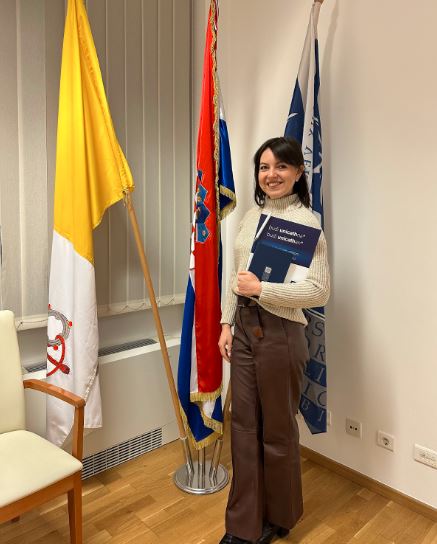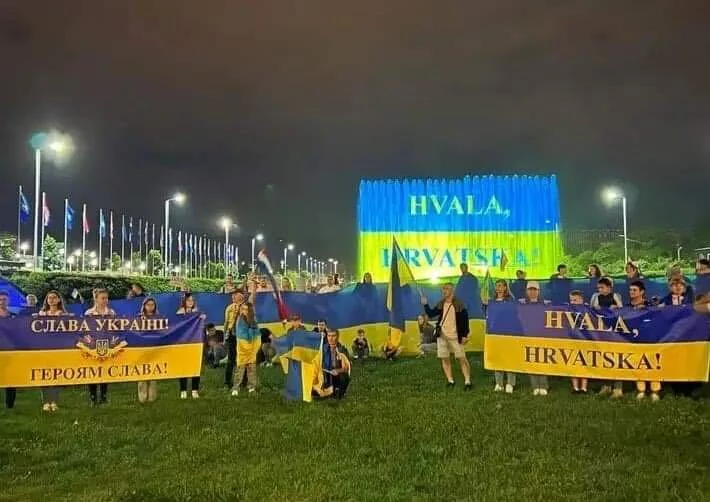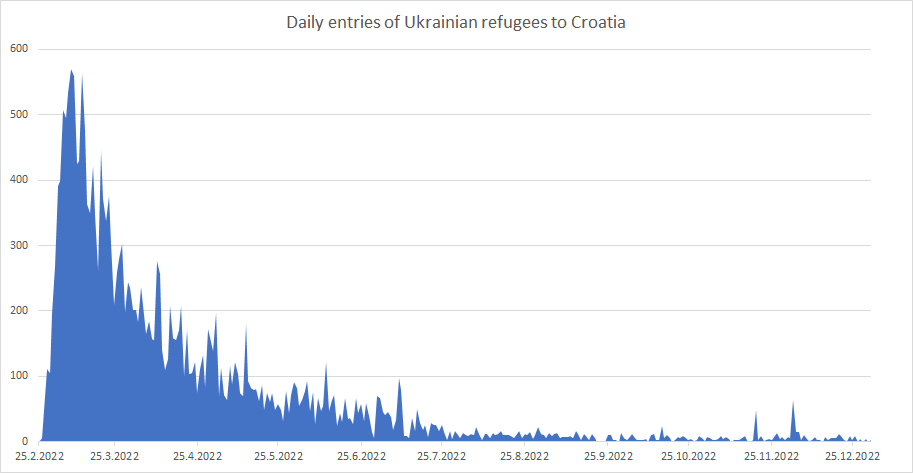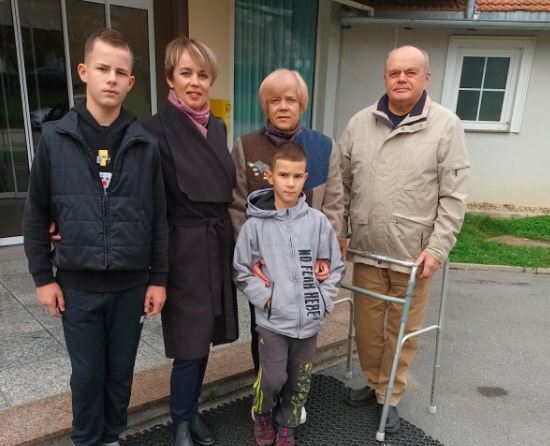Iryna and Viktoriia, two Ukrainian refugees, have been brought together by circumstance in the heart of Zagreb, the capital of Croatia. Despite their different backgrounds, both women have been forced to flee their homeland due to the Russian war against Ukraine.
Although Viktoriia and Iryna arrived in Zagreb at different times, they now share a common purpose. They aim to attend Croatian language and culture classes and rebuild their lives in this new and unfamiliar setting. We meet with them at Zagreb's Catholic University, where Ukrainians in Zagreb can take free Croatian language lessons.
"Initially, I planned to go to Montenegro and attempt to settle there. But instead, I traveled with my cat from Kharkiv to the Hungarian border and ended up in Zagreb. The day after I arrived, I went for a walk. It was a sunny, balmy day, and Zagreb began to feel like home. The smell, the people, the sun… So, I decided to stay here,” as told by Iryna Pronenko, an HR and recruitment specialist working at the NGO ”SVOJA.”
Viktoriia Panchenko and her children now call Croatia their new home. It was not easy for Viktoriia to leave behind everything she had ever known.
"One of my friends in Croatia suggested that we come here. She said the people are welcoming and friendly, and they'll go out of their way to help Ukrainians," Viktoriia explains.
And so, with hope in her heart and her two young children by her side, Viktoriia set out to start a new life in a foreign country.
Viktoriia stated that "the children and their families were incredibly welcoming. We have them coming to our home, and my children will visit theirs. They had special Croatian classes in in school to help them pick up lessons faster."
Seeking employment and fighting bureaucracy
Both Iryna and Viktoriia are currently employed in Croatia and share a strong desire to contribute to the country and its society. "We are committed to working hard and making a positive impact in Croatia," Viktoriia says.
Iryna chimes in, "I fully agree; in fact, through the NGO I work with, we've already helped hundreds of Ukrainians find employment opportunities here in Croatia."

Prior to her current role, Iryna worked as an HR manager in Ukraine. She was originally from the Donbas Oblast, but was forced to leave her home in 2014 due to Russia's occupation of parts of the oblast and the illegal annexation of Crimea.
"After leaving, I rebuilt my life and career in Kharkiv, before being forced to flee once again, this time to Croatia," explains Iryna.
Ms. Meleško, president of the Ukrainian community in Zagreb, mentions that there are about 7,000 Ukrainians in Zagreb and Zagreb County.
"More than 2,000 of them [Ukrainians - ed.] already found employment," she adds.
Employment is an important topic. Iryna highlighted the significance of job opportunities for Ukrainians, revealing that their NGO had created a leaflet aimed at Croatian employers. The leaflet's main message was simple: if employers want to assist Ukrainians, providing job opportunities is the most effective way to do so.
Viktoriia previously worked as a dentist in Ukraine. Now, she's working for the Croatian Red Cross in Zagreb, the same organization that initially helped her.
"We are now helping some Ukrainians, but mostly Croatians," says Viktoriia.
She is involved in an EU-funded project called "Zaželi" (Make a wish) aimed at helping women who have difficulty finding employment, especially those from remote or rural areas.
Viktoriia identified bureaucracy as one of her biggest challenges. The nostrification process for her degree is slow, and her educational credentials would be accepted much faster in Germany than in Croatia. Iryna agrees, describing the bureaucratic system as slow and under-capacitated. This sentiment resonates with many Croatians, who often experience delays and obstacles when dealing with government processes.
Furthermore, it appears that the Ukrainian Embassy and Croatia's Civil Protection have equal personnel dedicated to assisting Ukrainians, even though over 22,000 individuals depend on their aid. Nevertheless, Ms. Meleško praises their interactions with the Croatian police and Civil Protection.
"They are prompt and eager to provide us pertinent information. We greatly appreciate their generosity and unwavering support, as well as that of the Croatian government and people," says Ms. Meleško.
Croatian police have established several offices within their local police stations that primarily serve the needs of Ukrainian refugees. These offices are oftentimes the initial point of contact for Ukrainians interacting with Croatian police. There, they can obtain the documentation for their protection mechanism rights and sort out all the required paperwork. Additionally, the Croatian Ministry of Interior (MUP) launched a “Croatian for Ukraine” website in both Croatian and Ukrainian where Ukrainians can find all the information and help they need, from paperwork to housing assistance. The Croatian version of the website provides information on how people in Croatia can assist refugees, and allows them to offer their help through the website.
Adapting to a new life and anticipating the future
Viktoriia and Iryna both recognize the importance of learning the Croatian language for their successful integration into Croatian society. We spoke primarily Croatian during our conversations, with only a few instances of Ukrainian, showcasing their dedication to learning a new language.
In under a year, they have become proficient in Croatian. They are now advancing their language skills by immersing themselves in Croatia’s culture, history, and other aspects.
We asked about their future plans, and whether they intended to remain in Croatia or had considered returning to Ukraine.
Iryna mentioned that she is still figuring out her plans and is taking it one day at a time. On the other hand, Viktoriia wants to remain in Croatia and contribute positively. This sentiment of giving back to their host country was a recurring theme in our conversation. Despite benefiting from the EU’s Temporary Protection Mechanism, which allows them to work, live, receive healthcare coverage, and attend school, they both aspire to make an impact.
Ms. Meleško emphasized that Viktoriia and Iryna are committed to supporting other refugees, as they have firsthand experience of their challenges.
We asked whether they had encountered any negative experiences or discrimination in Croatia.
Viktoriia and Iryna responded that they had not experienced any discrimination during their stay in Croatia. On the contrary, the local community has welcomed them, offering various forms of support, including essentials, food, financial aid, and integration assistance.
Ms. Meleško echoes their positive experiences but acknowledges that there have been instances in some Croatian media where false allegations of refugees abusing social security benefits have been made.
While refugees were initially able to receive financial assistance, and their host got funds from the Croatian government, they are now receiving only what is necessary and in line with what Croatians are getting. Ms. Meleško characterizes this disinformation as "ill-intended and, to some degree, hurtful." Such isolated instances are the exception rather than the rule. The Social protection act applicable to Ukrainian refugees is identical to Croatian citizens in similar situations.
Croatian populist and anti-EU politician Ivan Vilibor Sinčić (who is also a MEP) criticized the Croatian government’s decision to pay up to €475 ($517) to hosts of Ukrainian refugees for up to six months (depending on the number of people hosted and their status). Sinčić is a largely irrelevant political figure in Croatian politics but has been active in spreading Russian propaganda alongside other former party colleagues from his party “Živi zid” (Human shield).
In the 2020 parliamentary election, “Živi zid” received only 30,722 votes as part of the “Dosta pljačke” (Enough stealing) coalition, which was insufficient to secure a single seat in the Croatian Sabor. Sinčić has since parted ways with Bunjac and Pernar following their intra-party disputes over EU Parliament representation.

Connecting with home
How do Iryna and Viktoriia maintain contact with their families? Viktoriia's husband is in Ukraine, and they remain in daily contact.
"We communicate regularly via Telegram, WhatsApp, and phone. It's important for my children and me to be in contact with their father," said Viktoriia.
Iryna's situation is different. Her mother and grandmother remain in Russian-occupied areas of the Luhansk Oblast.
"Getting in touch with them is difficult since the Russians have cut off access to phones and most other services. My grandmother is elderly and ill, and my mother has decided to stay and care for her. Our contact is rare and limited because getting to an area where they have phone or internet access is dangerous," says Iryna.
Iryna's brother lives with his girlfriend in Ternopil, Ukraine.
Both Iryna and Viktoriia express hope for Ukraine’s efforts in the ongoing war. They are reluctant to make predictions about the conflict's duration, but their optimism extends beyond the situation in Ukraine.
What’s next?
It's essential to continue engaging with those most affected by Russia’s invasion of Ukraine, including refugees and their families, to maintain international attention and support.
The Croatian Ministry of Interior announced the extension of the Instrument of Temporary Protection for refugees. The program will be available until at least 4 March 2024, providing more security and stability for refugees in Croatia.
Croatia, having experienced war and over 500,000 refugees seeking asylum in the past, is expected to maintain its welcoming attitude toward Ukrainians and Ukrainian refugees. Croatia’s hospitality and tourism industry is thriving, and it is presumed that many Ukrainians will find employment opportunities in these sectors.
Stories like Iryna’s and Viktoriia’s capture the spirit of Ukrainians facing a crisis. They came to their new homes intending to contribute actively to society. Both Iryna and Viktoriia have begun working in Croatia, and Viktoriia's children attend Croatian schools. They are also helping fellow Ukrainians settle in Croatia.
As Ms Meleško said, “who’s better positioned to help those people than those who have experienced the same situation themselves.”
Background
Millions of Ukrainian refugees remain displaced in Europe one year after Russia's invasion of Ukraine. As the largest refugee crisis of the 21st century, a majority are seeking shelter in European countries.
Today, 22,407 individuals seek to rebuild their lives in Croatia, a country with a history of refugee crises. The Yugoslav Wars in the 1990s led to nearly 640,000 refugees in Croatia, many from neighboring Bosnia and Herzegovina.

The Yugoslav Wars (1991-1995) began when Croatia declared independence from Yugoslavia. The conflict involved the Yugoslav National Army and local Serb militias seeking a separate state within Croatia. The Dayton Accords in 1995 established a ceasefire and Croatia's current borders.
Ukraine recognized Croatia, and Croatia sent military aid to Ukraine in 2022. The Croatian Sabor condemned Russia's aggression and reaffirmed Ukraine's territorial integrity. Zagreb hosted the first international Crimean platform meeting in 2022.
As Ukrainian refugees arrived in Croatia in 2022, Croatia mobilized resources to provide aid and support. Refugees were registered, housed, and received humanitarian assistance.
As an EU member, Croatia grants refugees freedom of movement, employment, education, and access to services. Reception centers in Gosipć, Osijek, and Varaždin provide assistance before offering permanent housing.
Before the current influx, there were around 2000 ethnic Ukrainians in Croatia. With additional refugees, nearly 25,000 Ukrainians now live in the country.
David Kirichenko is a freelance journalist covering Eastern Europe and an editor at Euromaidan Press. He tweets @DVKirichenko.
Related:

